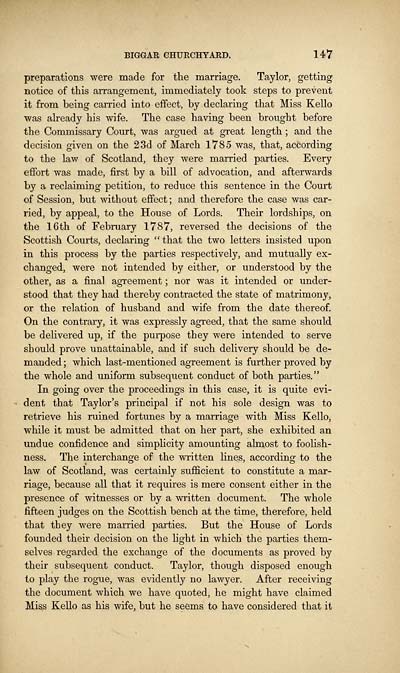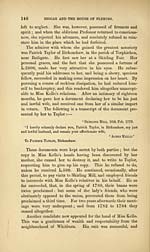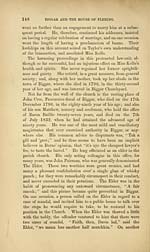Biggar and the House of Fleming
(173) Page 155
Download files
Complete book:
Individual page:
Thumbnail gallery: Grid view | List view

BIGGAR CHURCHYARD. 147
preparations were made for the marriage. Taylor, getting
notice of this arrangement, immediately took steps to prevent
it from being carried into effect, by declaring that Miss Kello
was already his wife. The case having been brought before
the Commissary Court, was argued at great length ; and the
decision given on the 23d of March 1785 was, that, according
to the law of Scotland, they were married parties. Every
effort was made, first by a bill of advocation, and afterwards
by a reclaiming petition, to reduce this sentence in the Court
of Session, but without effect; and therefore the case was car-
ried, by appeal, to the House of Lords. Their lordships, on
the 16th of February 1787, reversed the decisions of the
Scottish Courts, declaring " that the two letters insisted upon
in this process by the parties respectively, and mutually ex-
changed, were not intended by either, or understood by the
other, as a final agreement ; nor was it intended or under-
stood that they had thereby contracted the state of matrimony,
or the relation of husband and wife from the date thereof.
On the contrary, it was expressly agreed, that the same should
be delivered up, if the purpose they were intended to serve
should prove unattainable, and if such delivery should be de-
manded ; which last-mentioned agreement is further proved by
the whole and uniform subsequent conduct of both parties."
In going over the proceedings in this case, it is quite evi-
dent that Taylor's principal if not his sole design was to
retrieve his ruined fortunes by a marriage with Miss Kello,
while it must be admitted that on her part, she exhibited an
undue confidence and simplicity amounting almost to foolish-
ness. The interchange of the written lines, according to the
law of Scotland, was certainly sufficient to constitute a mar-
riage, because all that it requires is mere consent either in the
presence of witnesses or by a written document. The whole
fifteen judges on the Scottish bench at the time, therefore, held
that they were married parties. But the House of Lords
founded their decision on the light in which the parties them-
selves regarded the exchange of the documents as proved by
their subsequent conduct. Taylor, though disposed enough
to play the rogue, was evidently no lawyer. After receiving
the document which we have quoted, he might have claimed
Miss Kello as his wife, but he seems to have considered that it
preparations were made for the marriage. Taylor, getting
notice of this arrangement, immediately took steps to prevent
it from being carried into effect, by declaring that Miss Kello
was already his wife. The case having been brought before
the Commissary Court, was argued at great length ; and the
decision given on the 23d of March 1785 was, that, according
to the law of Scotland, they were married parties. Every
effort was made, first by a bill of advocation, and afterwards
by a reclaiming petition, to reduce this sentence in the Court
of Session, but without effect; and therefore the case was car-
ried, by appeal, to the House of Lords. Their lordships, on
the 16th of February 1787, reversed the decisions of the
Scottish Courts, declaring " that the two letters insisted upon
in this process by the parties respectively, and mutually ex-
changed, were not intended by either, or understood by the
other, as a final agreement ; nor was it intended or under-
stood that they had thereby contracted the state of matrimony,
or the relation of husband and wife from the date thereof.
On the contrary, it was expressly agreed, that the same should
be delivered up, if the purpose they were intended to serve
should prove unattainable, and if such delivery should be de-
manded ; which last-mentioned agreement is further proved by
the whole and uniform subsequent conduct of both parties."
In going over the proceedings in this case, it is quite evi-
dent that Taylor's principal if not his sole design was to
retrieve his ruined fortunes by a marriage with Miss Kello,
while it must be admitted that on her part, she exhibited an
undue confidence and simplicity amounting almost to foolish-
ness. The interchange of the written lines, according to the
law of Scotland, was certainly sufficient to constitute a mar-
riage, because all that it requires is mere consent either in the
presence of witnesses or by a written document. The whole
fifteen judges on the Scottish bench at the time, therefore, held
that they were married parties. But the House of Lords
founded their decision on the light in which the parties them-
selves regarded the exchange of the documents as proved by
their subsequent conduct. Taylor, though disposed enough
to play the rogue, was evidently no lawyer. After receiving
the document which we have quoted, he might have claimed
Miss Kello as his wife, but he seems to have considered that it
Set display mode to:
![]() Universal Viewer |
Universal Viewer | ![]() Mirador |
Large image | Transcription
Mirador |
Large image | Transcription
Images and transcriptions on this page, including medium image downloads, may be used under the Creative Commons Attribution 4.0 International Licence unless otherwise stated. ![]()
| Histories of Scottish families > Biggar and the House of Fleming > (173) Page 155 |
|---|
| Permanent URL | https://digital.nls.uk/94841358 |
|---|
| Description | A selection of almost 400 printed items relating to the history of Scottish families, mostly dating from the 19th and early 20th centuries. Includes memoirs, genealogies and clan histories, with a few produced by emigrant families. The earliest family history goes back to AD 916. |
|---|

